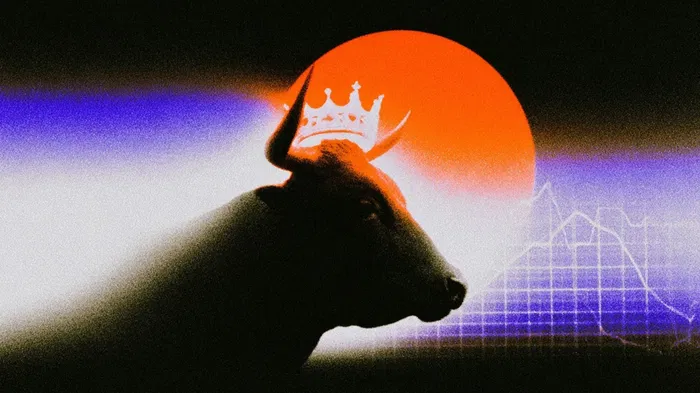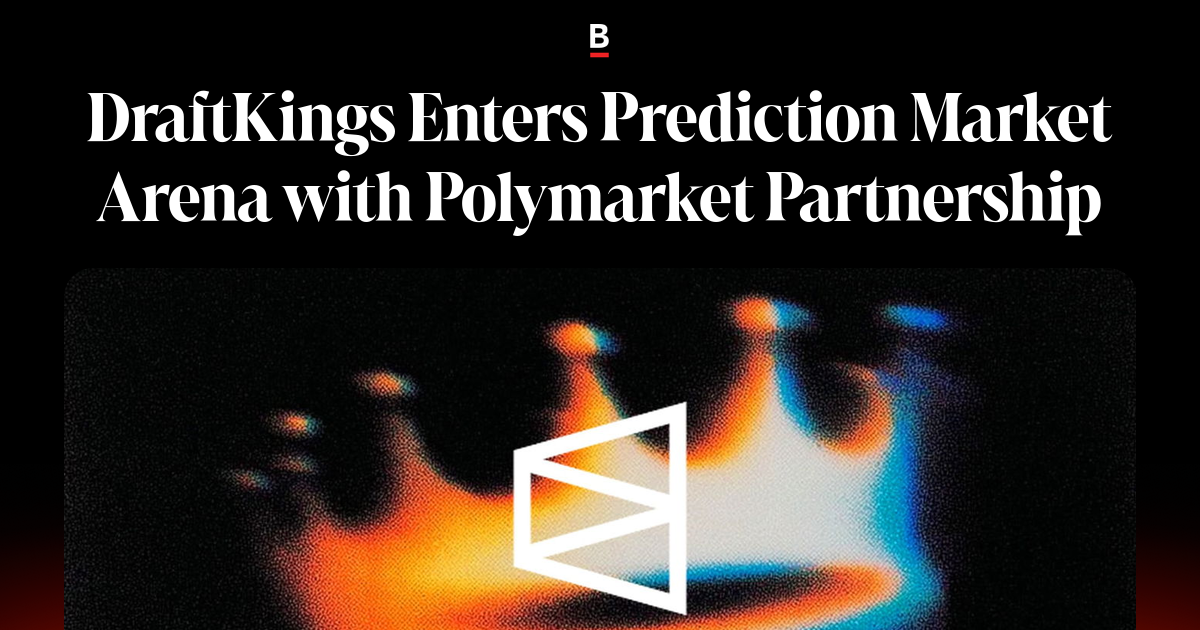
Subscribe to Bankless or sign in
While private market speculators are busy FOMOing into top prediction market raises with billion-dollar checks, the best opportunity to profit from the mania may be quietly slipping through their fingers.
Prediction markets are recognized as the next great frontier for crypto speculation, truth, and retail engagement, yet as investors ape venture-stage opportunities like  Polymarket and Kalshi at nosebleed valuations, they’re actively selling the real juggernaut hiding in plain sight...
Polymarket and Kalshi at nosebleed valuations, they’re actively selling the real juggernaut hiding in plain sight...
Today, we’re discussing why DraftKings could be best positioned to dominate the prediction market playground 👇
🐂 Prediction Market King?
DraftKings, a popular online multi-national sports gambling platform, went public on the Nasdaq Exchange via SPAC in April 2020 under the ticker symbol DKNG.
At market close on October 29, DKNG carried a $15.2B market capitalization, only a hair more than the $15B private market valuation that prediction market upstart Polymarket was reported as pursuing just the week prior.
DraftKings Background
DKNG stock had been performing well off the January 2023 broad market bottom, registering gains of over 400% as company revenues swelled alongside economic optimism. DraftKings’ fortunes took a sharp turn last month as shares shed one-third of their value into late October as pronounced fears of prediction market competition compounded on widespread weakness plaguing gambling sector stocks.
In an obvious attempt to combat this share price decline, DraftKings announced last Thursday that it had acquired Railbird Technologies Inc. and its CFTC-regulated exchange subsidiary, a move that will enable DraftKings to directly compete with prediction markets by offering its own regulated event contracts.
Along with the acquisition, DraftKings is slated to release a mobile app that allows users to trade regulated event contracts spanning finance, culture, entertainment, and more. The platform will be designed to integrate across multiple exchanges (including Polymarket) to provide bettors access to the broadest suites of prediction markets available.

Prediction Market Context
The launch of legal prediction markets throughout the United States was made possible by Kalshi’s landmark September 2024 legal victory against the CFTC.
When the Court ruled against the CFTC for trying to block Kalshi’s election contracts, which didn’t break any laws or qualify as gambling, it cleared the way for registered prediction markets to self-certify event contracts for trading nationwide without prior CFTC approval.
Prediction markets may have first achieved widespread recognition during the 2024 U.S. general election, but they blossomed in 2025 with their adoption of sports event contracts, which frequently generate mainstream publicity and multiply markets across a diversified range of sporting contests.
Sports gambling has become big business on Polymarket and Kalshi, which respectively process upwards of 30% and 90% of their weekly trading volumes as sporting event contracts on a consistent basis.
Polymarket vs Kalshi Top-categories:
— Atlantis liquidity (@Atlantislq) October 25, 2025
> Polymarket: Politics, Sports, Crypto, Culture, Trump
> Kalshi: Sports, Crypto, Politics (everything else <1%)
Fun fact: Sports = 92% of Kalshi volume while Polymarket users love Trump more than Tech or Weather markets. pic.twitter.com/6sEjH2WD7H
Sports Contract Legality
Prediction markets have freely listed sports event contracts under their self-certification powers, but there’s no clear legal basis for it right now.
Under the Commodity Exchange Act (CEA), which gives the CFTC nationwide authority to regulate event contracts as financial swap instruments, the CFTC is expressly delegated the powers to prohibit any contract that is “contrary to the public interest.”
The CEA explicitly deems “gaming” contracts as prohibited, and while the term was contested in the above Kalshi v. CFTC ruling, that court was not tasked with determining whether sports-related contracts involve gaming, leaving the matter very much open.
The Trump-era CFTC is unlikely to stand in the way of prediction markets, but their sports contracts have angered a powerful mix of entrenched interests.
Regulated gaming lobbies and tribal gaming groups find themselves united in a pressure campaign to quash hype around fledgling sports event contracts. Meanwhile, numerous state gambling commissions have issued cease-and-desist orders to prediction marketplaces, arguing they operate as unlicensed sports gambling venues in violation of their respective state laws.
In their defense, prediction marketplaces steadfastly argue that there is no need to comply with well-defined state sports gambling laws, as their event contracts are regulated at a federal level and the United States Constitution’s supremacy clause gives precedence to federal law when it conflicts against state law.
Still, with the question of whether sports events contracts constitute prohibited “gaming” markets unanswered, and their direct dependency on the outcome of a “game” well known, prediction markets without state gambling licenses appear to be largely relying on unproven legal theory.
6 states are now in litigation with Kalshi:
— Daniel Wallach (@WALLACHLEGAL) October 27, 2025
- NV
- NJ
- MD
- MA
- OH
- NY
In 5 out of 6 cases, Kalshi sued first (MA the lone exception).
Why don't states sue first?
Advance notice requirement.
Section 63(12) of NY Executive Law requires 5 days notice. https://t.co/5OVQ0kYM28 pic.twitter.com/maPk86f5QX
Undervalued Opportunity?
Amid the frenzied bid for prediction markets and the billion-dollar venture checks chasing them, it is ironic to see DKNG hiding in plain sight, getting sold off by the market while prediction market up-and-comers command premium valuations.
DraftKings already holds state-level gambling licenses across the United States, a regulatory advantage that will be difficult for Polymarket and Kalshi to match. It operates on clear legal footings and boasts four times as many users as Polymarket and Kalshi combined, yet trades at a similar valuation to the venture-backed pair.
Whether or not sports prediction markets are ultimately legalized may have minimal bearing on DraftKings' continued staying power, as it already controls around one-third of the U.S. traditional sports gambling market by revenue.
If sports event contracts are outright banned, DraftKings can fall back on its traditional gambling book. Should state-specific licenses become required for companies that offer sporting event contracts, DraftKings will further entrench its regulatory moat. And in the event prediction market mania persists unchecked by law, DraftKings has the scale to potentially capture demand.
The size of global sports betting markets was estimated at ~$100B in 2024. By 2030, this figure is expected to reach $187B, implying an industry-wide growth rate of approximately 11% per year that underscores the upside potential for platforms riding the betting momentum wave.
While this analysis primarily focused on the bull case for DraftKings – the largest sports gambling venue by volume and the only company with publicly declared intentions to create a prediction markets platform – many of its arguments can be applied to similarly beleaguered regulated sports books stocks, like FanDuel parent Flutter (NYSE: FLUT).
Additionally, while regulated sports books appear poised to outperform prediction markets without state gambling licenses, this does not guarantee their stock will make for a good bet in absolute dollar terms, particularly in light of sector-wide weakness that may warn of brewing problems throughout the broader gaming industry.



